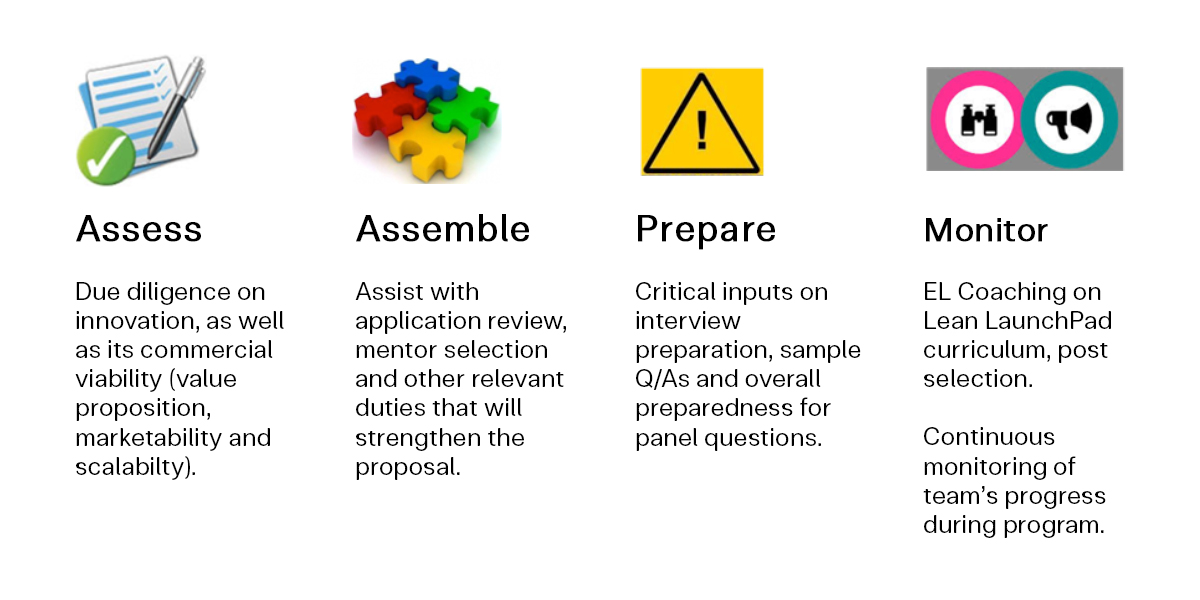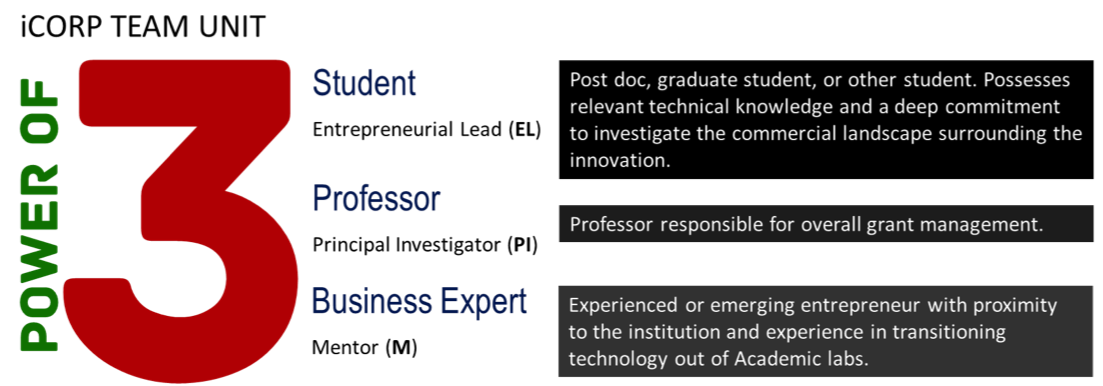CTTC has a dedicated focus on the National Science Foundation (NSF) initiated Innovation Corps (I-Corps) program. The I-Corps program presents unique opportunities to accelerate innovation and new venture creation throughout the Vanderbilt community.
We welcome all aspiring entrepreneurs to explore I-Corps and reap the benefits of early customer discovery through programming, mentorship and funding support.
-
The Program
-
The NSF Innovation Corps (I-Corps) is a set of activities and programs that prepare scientists and engineers to extend their focus beyond the laboratory and broadens the impact of select, NSF-funded, basic-research projects. The primary goal of NSF I-Corps is to foster entrepreneurship that will lead to the commercialization of technology that has been supported previously by NSF-funded research. More.
I-Corps Teams are composed of three main members:
The I-Corps Teams grant is six-months in duration. This includes participation in the cohorts, online learning modules and ongoing customer discovery. All three members of the team participate fully in the I-Corps Curriculum.
To be eligible to pursue funding under an I-Corps Teams award, applicants must have received a prior award from NSF (in a scientific or engineering field relevant to the proposed innovation) that is currently active or that has been active within five years from the date of the I-Corps Teams proposal submission. The lineage of the prior award extends to the PI, Co-PIs, Senior Personnel, Post Docs, Professional Staff or others who were supported under the award. The prior award could range from a modest single-investigator award to a large, distributed center and also includes awards involving students such as REU Sites.
The outcomes of I-Corps Teams projects will be threefold: 1) a clear go/no go decision regarding viability of products and services, 2) should the decision be to move the effort forward, a transition plan to do so, and 3) a technology demonstration for potential partners.
The National Science Foundation has a comprehensive site which can be found at: http://www.nsf.gov/news/special_reports/i-corps/teams.jsp
Information source: NSF I-Corps.
-
-
Our Role
-
The role of the CTTC is to foster, facilitate and champion Vanderbilt’s efforts in the I-Corps Team program. We play a critical part throughout the duration of the program.

CTTC is serious about putting forth viable and scalable innovations that can truly benefit from early funding through the I-Corps Team program. We expect 100% commitment from the selected Vanderbilt Teams so as to ensure maximum impact from the Lean LaunchPad curriculum. For past winners click here.
CTTC will assess EVERY proposal on the merit of three primary criteria: viability, marketability and scalability as each relates to the innovation under consideration. Additionally, we will determine the merits of the Team from an execution stand point. The core objective of our efforts is to ensure quantifiable success on the program.
Contact us, if you feel you have what it takes to explore I-Corps.
-
-
Mentorship
-
Within each I-Corps project team, the I-Corps Mentor will play an essential role: providing insight from the private sector. This individual typically will be an experienced or emerging entrepreneur with experience in transitioning technology out of academic labs. He or she will also be in close proximity to the academic institution and have connections throughout the region.
The I-Corps Mentor will serve as the principal guide in determining the technology disposition. He or she also will be responsible for regularly updating the cognizant NSF I-Corps program director on progress toward this goal.
Mentors need to be intimately involved with their team. As part of the 15 hours of effort, the mentors need to commit five (three for the curriculum + two) hours of "face time" per week. These team meetings must include:
-
Updating the customer contact strategy--the teams needs to make five to ten customer contacts per week.
-
Ensuring that there is at least one update per week from the Mentor, the Entrepreneurial Lead and Principal Investigator.
-
Summarize the lessons learned from the week and figure out the next steps.
-
Reviewing the teams weekly presentation before they present to their peers.
-
Identifying and correcting gaps in the Principal Investigator and Entrepreneurial Lead's business knowledge.
CTTC is highly selective in its Mentor intake process. Contact us if you are interested in applying to the Mentor pool.
-
-
-
Past VU I-Corps Winners
-
Fall 2013: NYC, NY Cohort
Winner: Team EndoInsight
EL: Byron Smith
PI: Pietro Valdastri
About: EndoInSight is a disposable CO2 insufflation system for the colonoscopy market that will help clinicians improve patient outcomes while reducing procedure and recovery times.
Spring / Summer 2014: Ann Arbor, MI Cohort
Winner: Team Filtergraph
EL: Dan Burger, Rachel-Chloe Gibbs
PI: Keivan Stassun
About: Filtergraph (ww.filtergraph.vanderbilt.edu) is a web application designed to flexibly and rapidly visualize large datasets. The user loads a dataset in a variety of supported file types into Filtergraph, which automatically generates an interactive data portal that can be easily shared with others.
Fall 2014: Austin, TX Cohort
Winner: Team PinPtr
EL: Will Hedgecock
PI: Ákos Lédeczi
About: Cloud-based positioning system using our own patent-pending localization methodology and a network of stationary base stations.
Fall 2014: Austin, TX Cohort
Winner: Team VenoStent
EL: Timothy Boire
PI: Hak-Joon Sung
About: VenoStent is designed to prevent intimal hyperplasia so that the initial coronary artery bypass grafting procedure is more successful and does not require re-do operations.
-





